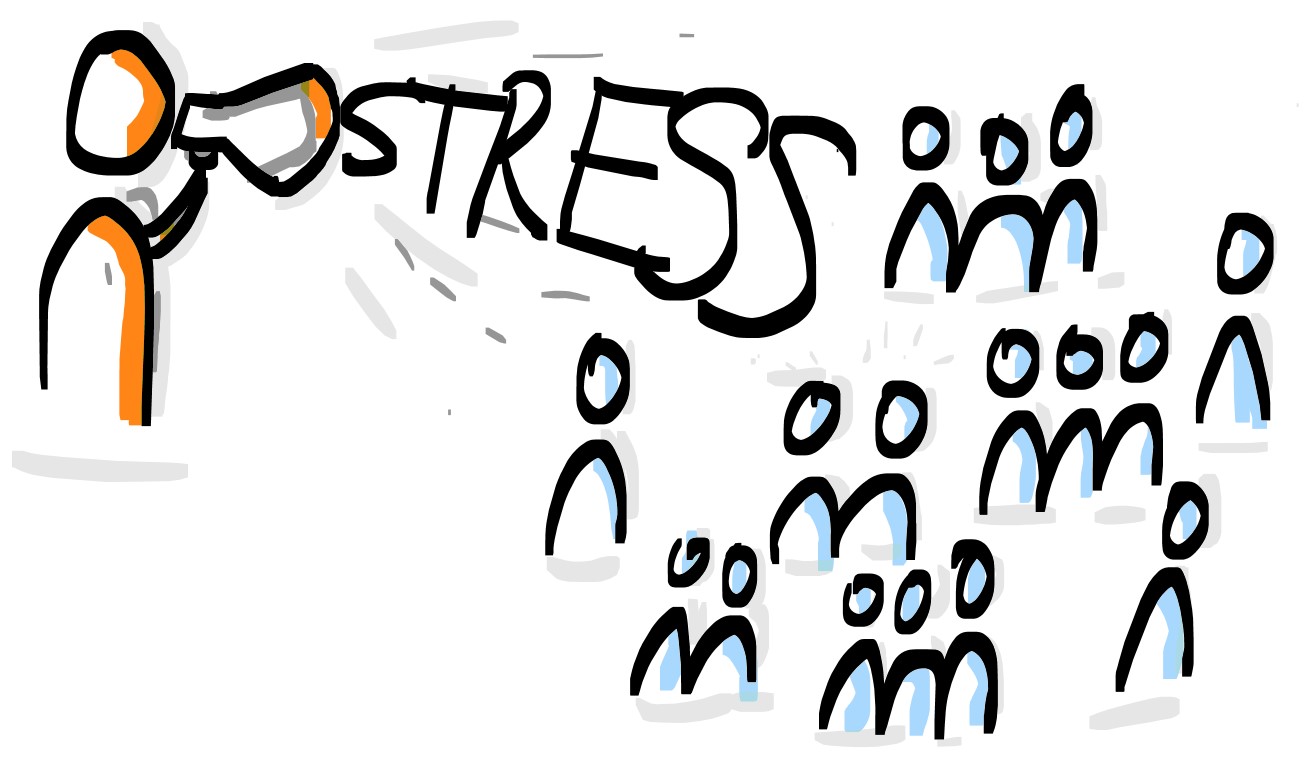As professionals, we shouldn’t accept stress in any form. Because it is close to physical violence. And because it is a major business risk.
Stress is good.
It allows us to react quickly, with focus and efficiency, and to master difficult situations. We often outgrow ourselves in the process. So the benefits of stress are obvious.
And, ooh, they’re tempting! After all, who wouldn’t want to be consistently at their best in today’s world, where so much is about optimization, efficiency, and competition? And what boss doesn’t dream of such employees and teams?
So this is very simple: Stress!

Let’s Stress!
There are a lot of suitable measures to reliably and permanently put individuals, groups, or the entire company under pressure. To permanently (over)demand. To make people highly efficient — and because of the stress-related tunnel vision also more manipulable. Here are a few ideas:
- One project after another, with tight or utopian deadlines.
- Keep teams permanently understaffed.
- Denounce pitfalls publicly or subtly (“Get a coach to help you get back on track”).
- Permanently point out the difficult economic situation and the associated constraints.
- Do not forget to always mention the compulsion to get more out of everything.
- Threaten covertly or blatantly openly with job loss (“Whoever is too weak or doesn’t want to cooperate, may leave!”).
- Generally, keep the workload high and ostentatiously ignore structural problems.
- Shift them onto individual employees or teams.
- Overtime? The employee’s problem. (“You’ll have to see for yourself how you manage that!”)
- And sometimes — yes, even that: bullying or inciting bullying to get rid of unpleasant employees (“Just make sure that she’s uncomfortable with us!”).
“Karōshi” (Jap. 過労死, death from overwork) is the term used in Japan to describe a sudden work-related death. The cause of death is usually a heart attack or stroke triggered by stress. It is disputed whether suicides resulting from work-related mental illness (過労自殺 Karōjisatsu) fall under the definition.” (Wikipedia “Karoshi”)
 Whenever and wherever…
Whenever and wherever…
…these things happen, the reported results look good over a certain time. However, these results are bought with dubious means. And success is nearing an abrupt end, although it often is delayed with costly measures, pushing the unprofessional approach to the extreme.
Because: Peak phases of performance are just one part of the stress pattern.
The other important part is: People necessarily need periods of rest. How else can they rebuild the energy they have just used up? How and when else should they be creative and develop good, innovative business ideas? This applies to individuals. It applies to entire teams, too.
Learning From Power Teams
We know from positive and motivational psychology, from professional sports, and generally from successful teams: Those who have mastered the alternation of tension, relaxation and regeneration achieve flow, good results, and success in the long run.
Managers who lack this insight or — worse — who deliberately ignore it, inevitably head for performance gaps and failures:
- High sickness rates
- brain drain
- bad working climate with many unproductive conflicts
- demoralized and demotivated employees
- worse products
- dissatisfied customers…
And all this for a long time! Because a downward spiral is set in motion — only to be stopped and turned around with huge effort — if at all.

This is why managers and employees who consciously or unconsciously allow stress are considerable, fundamental business risks. They act unprofessionally and irresponsibly.
In today’s times of disruption, generally declining productivity, fierce competition, and a lack of skilled workers, their actions are particularly devastating. On top of all this: They are endangering people’s health and harming the entire company. And the public.
The damage…
…is vast because stress is not only somehow unpleasant (or — without exaggeration — sometimes life-threatening). It also means long periods of absence together with high health costs over a long time. These are covered by everyone. Also by society. Also by society.
If long-lasting organizational, structural stress is encouraged or even tolerated, it is quite justified to speak of bodily injury, or at least of anti-social behavior.
For good reason bodily injury is forbidden and physical and psychological integrity is guaranteed by law.
 It shouldn’t be the law
It shouldn’t be the law
though, urging us to refrain from, prevent, and also punish consistently deliberate or negligent organizational stress practices. It should be the overwhelmingly good health and economic reasons. It’s in our own best interests. As owners, managers, employees, colleagues, customers, citizens, simply as people who want to and must live as long as possible in good health and well from working together.
Just imagine working without stress. Motivated. Relaxed. Joyful. The possibilities we’d had!
 Whenever and wherever…
Whenever and wherever… It shouldn’t be the law
It shouldn’t be the law